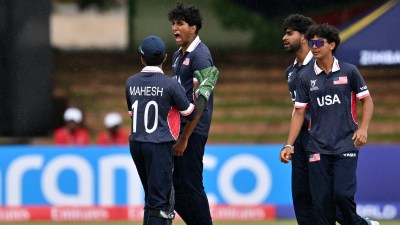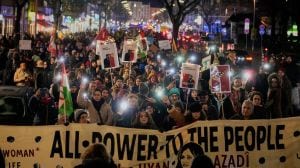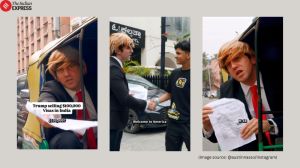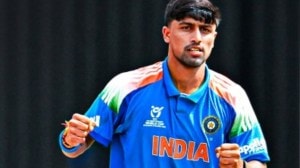Justice M.C. Jain has devoted a considerable part of his final report for arguing his own case. Troubled and tired by the avalanche of ridicule that he faced in the press and public after the interim report, Justice Jain has asked for an amendment in the 1952 Commissions of Inquiry Act.
He wants commissions to have the power to initiate action and contempt proceedings against any 8220;ridicule8221; or 8220;disrepute8221;. Justice Jain says he was making the recommendation in the light of his own 8220;experience8221; while heading the inquiry into the assassination of former prime minister Rajiv Gandhi. 8220;If commissions are made the butt of ridicule, then the importance of the high-powered judicial commissions gets undermined,8221; he adds.

Jain alleges that the Jain Commission became the subject of 8220;baseless, unfounded and incorrect8221; press reports and insinuations that he was behind the leaks of sections of the interim report to the press. 8220;It would be an unjudge-like conduct to reveal or divulge the contents of thereport,8221; he says.
He says that when the controversy about the leak began, he wrote a letter to then prime minister I.K. Gujral. He quotes his own letter: 8220;Initiation of proceedings against the commission by the CBI is bound to impede the progress of the inquiry. This may also be construed in some quarters as intimidation and harassments of the commission. I am sure you will not allow such a development. Else I feel no judge would like to shoulder the responsibility of such a highly sensitive inquiry of public importance in future8230;8221;
In the final report, Justice Jain also makes out his case for not being able to present a watertight conspiracy case despite the commission8217;s almost seven-year long existence. He says the 8220;standards of proof8221; in a commission were different from that of a court trial. In a criminal case, guilt was established by 8220;unimpeachable legally admissible evidence8221;. But a commission is 8220;only required to arrive at the truth by relation of evidence worthy of credence and cautionhas to be taken in respect of evidence which might be fabricated or concocted,8221; he says.
The report states: 8220;The Commission, therefore, wants to emphasise that whatever views have been expressed or observations have been made or findings have been recommended, they are all based on the evidence and material which have come before the commission8230;8221;
Justice Jain also devotes the pages of the report to the alleged attempts of the P.V. Narasimha Rao government to 8220;wind up8221; the commission mid-way through its proceedings. Jain says while the relevant file on the cabinet meeting was not produced before the commission, senior bureaucrats and ministers gave the commission a precise picture of what happened.
Story continues below this ad
Jain relies heavily on the deposition of former cabinet secretary Zafar Saifullah and to some extent, that of N.N. Vohra, former home secretary. Vohra says the decision to hold a Cabinet meeting on the subject of the Jain Commission was taken 8220;hastily8221;in the morning itself which was 8220;unusual8221;.During the meeting, Arjun Singh opposed the move and said that since this was a sensitive issue, no quick decision should be taken. Only then did the prime minister intervene and said he too was 8220;surprised8221; at the suggestion to wind up the Jain Commission and remarked on the 8220;undesirability8221; of rushing into such an important decision.
Saifullah also told the commission that Rao had asked him to act as the nodal officer for submitting documents to the Jain Commission and at that stage told him to 8220;stoutly deny8221; existence of some documents.
On the controversy about the 8220;missing file8221; on the Jain Commission, Saifullah8217;s statement reads: 8220;There was some file which was reported missing from the PMO. A thorough search was made and the file could not be located. Even it was not sure what was the movement of the file and whether it had at all reached the PMO8230; The missing of files for the Government is nothing new.8221;
Jain cites the testimony of former home minister S.B. Chavan while discussing thesubject of delay and lack of co-ordination between government agencies. Chavan says that he was hardly ever informed about developments concerning the Jain Commission. He also says that he 8220;does not recall any information about the larger conspiracy 8221; coming to him.
Story continues below this ad
Jain notes that the statements made by Chavan and Narasimha Rao show the state of interaction between the prime minister and the home minister. He says: 8220;It is unthinkable that in such a serious and sensitive inquiry, the existence of documents can be denied. It is, however, not certain that all the relevant documents have actually been produced. If the statement of Zafar Saifullah can be believed, more should have been8230;8221;
Justice Jain reiterates that the Jain Commission was in no way responsible for causing delay in the trial of the Rajiv Gandhi accused. 8220;The delay, in fact, was caused in the proceedings of the commission in view of the stand taken by the Central government, including the SIT8230;8221;
Jain says on February 28, 1998, thecommission wrote to the Government asking for a two-month extension. This was, he says, because some crucial evidence like the file on wireless intercepts had only been received by them on February 10 and some files like the ones containing correspondence on information given by PLO chairman Yasser Arafat was yet to be submitted. The Government was also told that the CBI inquiry into the leakage of the interim report had 8220;slowed down8221; the pace of investigation.
Instead of an extension, on February 27, the Jain Commission got a letter from Nikhil Kumar, special secretary in the home ministry, giving the commission one week time to submit its final report. The letter mentioned that secretarial facilities would only be extended to the commission during this one week.
Story continues below this ad
Justice Jain complains: 8220;The public has been given an impression that the commission is perpetuating its existence despite several extensions given earlier.8221; 8220;There has never been any delay on part of the commission,8221; he asserts, 8220;insubmitting either the interim report or the final report.8221;
































